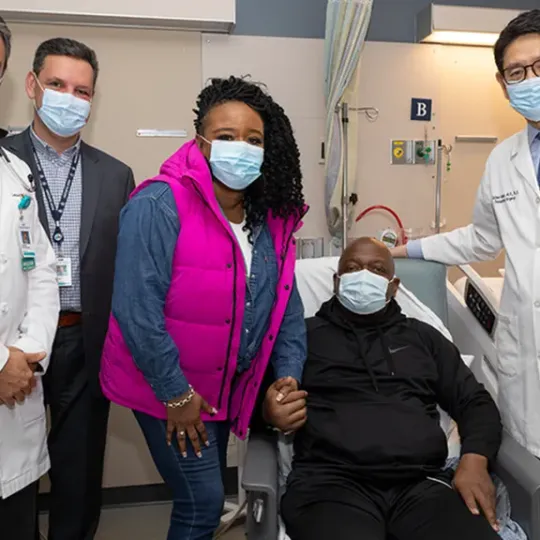
First Successful Combined Heart Pump and Pig Kidney Transplant
By Reinina Zhang
Xenotransplantation: the past, the present, and the promising future.
The world’s first combined mechanical heart pump and gene-edited pig kidney transplant was performed at NYU Langone Health in mid-April this year.
In a hospital room of NYU Langone Health Hospital, Dr. Robert Montgomery moves urgently among a sea of light blue scrubs, leaning over a tub containing a scarcely seen hospital resource—a pig kidney. He is preparing it for a xenotransplantation, or the transplantation of an organ from one species to another, for a patient named Lisa Pisano.
While speaking with WBNS-10TV, Pisano sits at the edge of her hospital bed as the bustling ambiance of the hospital, full of quick chatter and movement, blankets the scene.
“I want to spend time with my grandkids, do stuff with them,” Pisano states, the corners of her mouth slipping upwards as she smiles at the thought.
“Surgeons were forced to remove [Pisano’s] kidney on May 29 after it was damaged by inadequate blood flow related to [her previous] heart pump,” Roni Caryn Rabin of The New York Times wrote.
Rabin also describes how Pisano had then begun hospice care, agreeing to receive a pig kidney as well as another heart pump because she was not medically eligible for any other possibly life-saving treatment.
This is not the first time such a xenotransplantation has occurred. Rick Slayman was the first-ever patient to successfully receive a pig kidney in an operation that only included a xenotransplantation on March 21st, 2024. About a month later, Lisa Pisano would be the first person to successfully receive both a heart pump and a pig kidney xenotransplantation, and therefore the second person to ever successfully receive a pig kidney. Slayman’s transplantation occurred at the Massachusetts General Transplant Center (Massachusetts General Hospital), under the leadership of Dr. Leonardo V. Riella, Dr. Tatsuo Kawai, and Dr. Nahel Elias.
Slayman had been on dialysis after receiving a transplanted kidney, which failed. He was also suffering from hypertension and type 2 diabetes. In order to receive the pig kidney, a treatment still in its trial stages, Slayman and his doctors needed to apply for the FDA’s Extended Access Protocol, which allows usage of trial treatments when no other treatments are possible.
Rob Stein of NPR explains the gene editing process of the pigs developed for Rick Slayman’s case: “The eGenesis pigs are bred with 69 genetic modifications to prepare organs for human transplantation. The changes protect against a virus known to infect pigs as well as delete pig genes and add human genes to make the organs compatible with people.”
Xenotransplantation could be a huge opportunity for the United States, which currently hosts a kidney transplant shortage which may as well be considered a crisis: thousands of people die each year waiting for a kidney.
While one may assume that such a crisis is due to a lack of kidneys available to be used for transplants, this is untrue: a study published on December 16th of 2020 in the Journal of American Society of Nephrology found that of 1,103 kidneys discarded in the United States due to tissue abnormalities, 493 of such kidneys could be evaluated to be of similar quality to 493 kidneys transplanted and used in France. The U.S.’s kidney crisis can be traced to the intense and detailed selection process for kidneys, which discards a large percentage of usable kidneys.
However, in the eyes of certain medical professionals, the usage of a pig kidney xenotransplantation treatment dredges up several concerns of possible unethical consequences due to its experimental nature. Some, such as bioethicist Michael Gusamo, argue that clinical trials should be started for this treatment by the FDA to prepare for future cases, as little facts are known about its medical implications.
Furthermore, the National Kidney Foundation asserts that pig kidney xenotransplantation has not yet entered clinical trial stages with the FDA (as of May 31st of 2024) due to concerns that the practice may result in xenotransplants that cannot fulfill all the necessary functions of a human kidney, a possibly high amount of transplant rejections due to large differences in DNA between humans and animals, and a risk of spreading diseases from pigs to humans.
Unfortunately, Rick Slayman and Lisa Pisano both passed away weeks after their xenotransplantations. Many doctors and scientists are hopeful that the scientific and medical findings resulting in the two xenotransplantations may prove substantial in the near future in resolving the current kidney shortage for transplants, even as the operation has yet to be FDA approved.
“This research provides new hope for an unlimited supply of organs, a potential game-changer for the field of transplantation and those now dying for want of an organ,” discusses Dr. Robert Montgomery, who led the surgical team working on Lisa Pisano’s operation.
Both Slayman and Pisano nobly wished that their trial treatments would allow for the survival of others in the future, hoping that their own contributions would plant a seed for something which would extend far past their own lives.
“I saw it not only as a way to help me, but a way to provide hope for the thousands of people who need a transplant to survive,” Rick Slayman explained, describing his process of choosing to have a xenotransplantation operation.
“I just took a chance…if it didn’t work for me it might work for someone else. And it could help the next person or the next person,” Lisa Pisano remarked in her interview with WBNS-10TV, outlining her choice to undergo the experimental operation.
Pisano and Slayman’s legacies, along with the work of their doctors, have helped place people today as future audience members to witness a narrative of new genius and saved lives.



